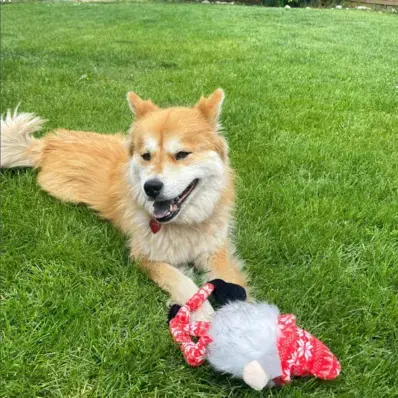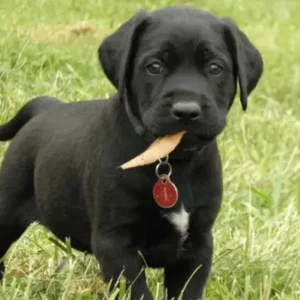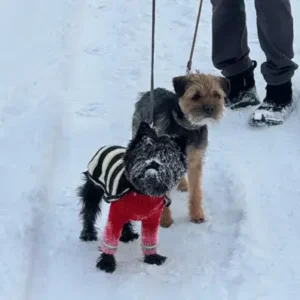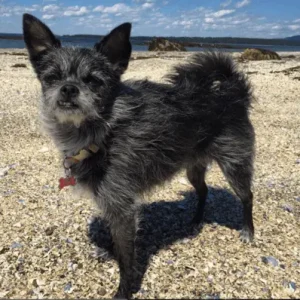Chusky History/Origin
The Chusky may have developed naturally over time, but designer breeders likely began intentionally crossing Chow Chow with Siberian Husky in the early 2000s, probably in North America.
While their striking appearance is a plus, breeders may have also paired these two breeds for their high intelligence. The Chusky’s combined smarts, size, and loyalty make excellent watchdogs, blending the best traits of both parent breeds.
Chusky Personality
The Chusky has a bold, independent personality, combining the intelligence of both the Chow Chow and Siberian Husky. These hybrid dogs are loyal and protective, making them excellent watchdogs, but can also be friendly and affectionate with their families.
- Potential Challenges
Chuskies can be stubborn and difficult to train, especially for inexperienced dog owners. They may develop separation anxiety when left alone for long periods, leading to destructive behaviors like chewing on furniture or household items.
Their loud, vocal nature and strong independence require patience and firm guidance. To manage these challenges, consistent training and plenty of mental and physical stimulation are essential.
Chusky Physical Appearance
The Chusky usually has a medium-length muzzle, with upright ears and a black nose. The muzzle can be either tapered like a Husky or broader like a Chow Chow. Their almond-shaped eyes may be brown, blue, hazel, or two different colors. They also have webbed, cat-like feet and a long, muscular body.
- Size
Being a relatively new mixed breed, the Chusky lacks established size standards. However, as a cross between the Siberian Husky and Chow Chow, they typically fall into the medium to large category. Most Chuskies weigh between 40 and 65 pounds and stand about 18 to 23 inches tall at the shoulder, though individual dogs may vary in size.
- Coat color
Chusky coats typically blend the fur and colors of their Chow Chow and Siberian Husky parents. Common colors include brown, black, cream, red, and white, with some dogs having solid coats while others display a mix of hues.
Brown Chusky with White Hues- Source: milliethechusky
Red Chusky with brown hues- Source: Pinterest
Chusky Gender Differences
Chuskies can vary in size, color, and body shape, but these differences aren’t solely based on gender. Males are generally bulkier with strong, blocky heads, while females tend to be slimmer and have narrower faces.
Both male and female Chuskies can display similar personality traits from their parent breeds. However, they may show aggression toward the same sex, so early socialization is important for their development like for any other dog breeds.
Chusky Feed/Nutrition
An ideal Chusky diet should be formulated for a medium to large-sized breed with high energy. They tend to gain weight if overfed, so it’s important to stick to a regular feeding schedule and avoid leaving food out during the day. Limit their treats as well, aiming for about 3 cups of dog food per day, divided into two meals.
Like all dogs, the Chusky’s dietary needs will change from puppyhood to adulthood and continue to evolve into their senior years. It’s best to consult your veterinarian for specific recommendations about your Chusky’s diet, as individual factors such as weight, energy level, and health can vary widely among dogs.
Pineapple can be a healthy treat in moderation, as it’s rich in vitamins, but make sure to remove the skin and core before offering it to your dog.
Chusky Health
The Chusky breed is at risk for some health conditions that affect both the Chow Chow and Siberian Husky. While many Chuskies are generally healthy, they can be susceptible to certain issues, making regular veterinary checkups and good care essential.
- Cataracts: Cataracts are a condition where the lens of the eye becomes cloudy, leading to blurred vision and potentially blindness if left untreated. Regular eye examinations can help detect cataracts early, and prompt surgical intervention may be necessary to restore vision.
- Entropion: Entropion is a condition where the eyelids roll inward, causing irritation and discomfort to the eye. This can lead to corneal damage if not addressed. Early detection is crucial, and surgical correction may be recommended by a veterinarian to prevent further complications.
- Hip Dysplasia: Hip dysplasia is a genetic condition where the hip joint doesn’t fit properly into the hip socket, leading to arthritis and pain. Maintaining a healthy weight and providing regular exercise can help reduce the risk of developing this condition. Regular veterinary checkups can also assist in monitoring hip health, allowing for early intervention if necessary.
Chusky Care and Grooming
While Chuskies are large dogs, it’s important not to overfeed them due to their tendency to gain weight and high energy levels. They should get at least 30 minutes to an hour of walking each day, along with active play sessions. Challenging hikes or runs can also be great for exercise when the weather allows.
Daily care is essential for your Chusky’s health. Check their ears for debris and clean them as recommended by your vet. Trim their nails once or twice a month to prevent them from getting too long.
Maintaining oral health is crucial, as Chuskies may be born with missing teeth. Brush their teeth daily, and consult your veterinarian for proper techniques.
With their fluffy double coats, Chuskies shed heavily, which may not be suitable for those with allergies. Regular brushing and grooming can help manage shedding. While they thrive in colder weather, their thick coats make them less suited for extreme heat.
Leash training your dog early helps ensure your dog walks calmly by your side, especially during outdoor activities and varying weather.
Chusky Rescue Groups
If you’re considering adopting a Chusky, rescuing one can be a wonderful option. Many Chuskies need loving homes, and adopting from a rescue organization not only gives a dog a second chance but also helps reduce the number of animals in shelters. Be sure to look for breed-specific rescue groups for both Chow Chows and Siberian Huskies, as they may have Chuskies available for adoption.
Chusky Price
The price of a Chusky typically ranges from $500 to $1,200, depending on factors such as breeder reputation, pedigree, and location.
If you’re interested in purchasing a Chusky, it’s essential to find a reputable breeder who prioritizes the health and well-being of their dogs. A good breeder will provide health screenings for the parent breeds and be transparent about the puppy’s lineage. Make sure to ask questions about the breeding practices and the care given to the puppies.
Interesting Facts
- Chuskies are known for their vocal nature, inheriting the talkative tendencies of the Husky. They may howl, “talk,” or make a variety of sounds, which can be entertaining but may require training to manage.
- Since Chuskies inherit traits from both Chow Chows and Siberian Huskies, their coats can have unique patterns and colors, making each dog visually distinct.
Best For
Chuskies are best suited for active individuals or families who enjoy outdoor activities and have the time to dedicate to exercise and training. Their high energy levels and playful nature make them a great fit for owners who can provide regular physical activity, such as hiking, running, or engaging play sessions. Additionally, experienced dog owners who can manage their stubbornness and provide consistent training will find Chuskies to be loving and loyal companions.
Top Names
| Male Chusky Names | Female Chusky Names |
| Kodiak | Luna |
| Maximus | Nala |
| Thor | Willow |
| Bear | Kira |
| Rocky | Bella |







 Chow Chow- Source:
Chow Chow- Source:  Siberian Husky- Source:
Siberian Husky- Source: 

 Brown Chusky with White Hues- Source:
Brown Chusky with White Hues- Source:  Red Chusky with brown hues- Source:
Red Chusky with brown hues- Source: 







